The wonder | Reseña| Review
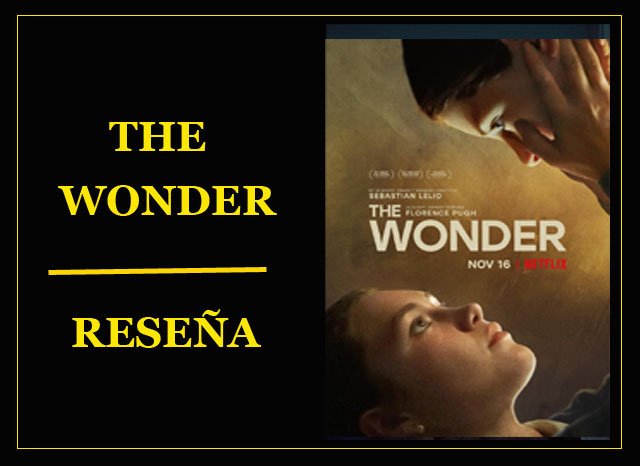
La mente humana tiene un comportamiento paradójico, es capaz de impulsarnos a la realización de cosas maravillosas pero al mismo tiempo puede convertirse en la cárcel más terrible…
Esta película “The Wonder”, en español “El Prodigio”, del año 2022, y dirigida por el chileno Sebastián Lelio, nos mete en uno de esos dilemas donde las creencias son tan poderosas que pueden llegar incluso a sacrificar la vida de las personas.
El comienzo del film es peculiar. Una voz en off, en un set vacío, nos invita a creer en la historia que vamos a ver…, la cámara se desplaza y de pronto nos mete en la escena, en una habitación oscura, del medio rural irlandés del siglo XIX, donde vemos una niña postrada en una cama rodeada de gente…
El resto de la película se desarrolla en una atmósfera de misterio. Un grupo de notables del pueblo convocan a una monja y a la enfermera Elizabeth "Lib" Wright ( Florence Pugh) , a realizar una investigación sobre el caso de la niña Anna (Kíla Lord Cassidy) , quien lleva cuatro meses sin comer.
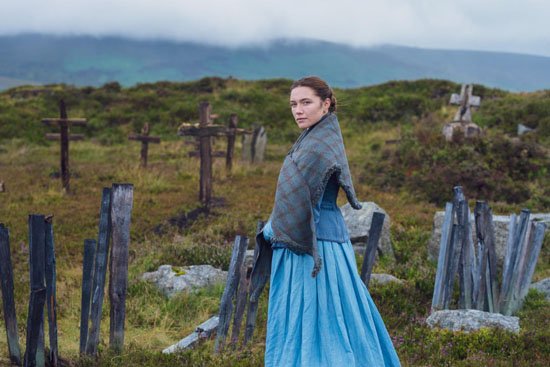
El objetivo de la investigación es determinar si se trata de algún hecho sobrenatural, de un milagro, o sí hay algo de simulación y trampa en el asunto.
Desde el principio la enfermera “Lib”, una mujer de carácter fuerte, apegada totalmente al punto de vista científico, impone las reglas de la investigación, está convencida que nadie puede vivir sin comer. Pero su tarea no le resulta nada fácil, cada paso que da para conocer la verdad se estrella contra un muro de creencias incomprensibles para ella.
Entre las medidas impuestas por la enfermera está que nadie toque a la niña. A partir de ese momento Anna comienza un deterioro progresivo que la pone al borde de la muerte, lo que confirma las sospechas de Lib de que la niña había estado recibiendo algún tipo de alimento en los meses anteriores.
La situación es extremadamente dramática, a nadie le importa si la niña muere. En tales circunstancias Lib hará una jugada muy arriesgada que afortunadamente le saldrá bien…
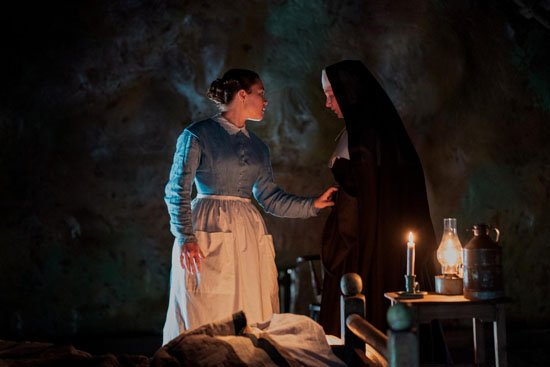
La película abre muchos temas, quizá el más importante sea el peso de las creencias.
El mundo rural donde vive Anna está completamente apegado a los dogmas de la religión, lo que en principio no tendría por qué ser negativo. Pero cuando las creencias de una religión se interpretan de manera irracional, fuera de cualquier contexto histórico o social y se llevan al extremo pueden revertirse contra las personas.
Y esto es lo que ocurre con la familia de Anna, ellos están convencidos que la niña debe expiar la falta por una relación incestuosa que sostuvo con su hermano unos años atrás. La falta ha sido subsanada en parte puesto que ese hermano murió de una enfermedad, lo que la familia interpreta como un castigo Divino…
Sin embargo, la niña ha sido sometida a un proceso de manipulación para convencerla que puede salvar a su hermano del fuego del infierno. Es por eso que Anna está dispuesta a dejarse morir de hambre y conseguir de ese modo la liberación de ambos…
Aquí habría un problema que la película no plantea, puesto que esa decisión de la niña es una especie de suicidio, y para los suicidas están cerradas las puertas del cielo…
La intervención de Lib pone de relieve el desencuentro de dos mentalidades, la científica y la espiritual, que en la película se presentan como irreconciliables, lo que no necesariamente tiene que ser así. Hay científicos notables que pueden moverse sin conflictos entre la racionalidad científica y la fe en lo espiritual, entienden que cada modo de pensar obedece a una esfera particular de la realidad humana.
En el film la salvación de Anna proviene del mundo de la ciencia, gracias a la intervención de Lib, quien también acude a la manipulación para cambiar la manera de pensar de la niña y de este modo salvarle la vida.
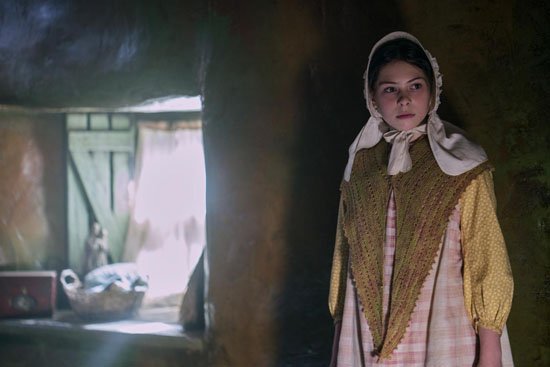
En ese juego de manipulaciones se pone de manifiesto la vulnerabilidad y flexibilidad de la mente humana; con las palabras adecuadas y los estímulos convenientes nuestro pensamiento puede oscilar de un lado a otro, puede sumirse en la oscuridad, o renovarse y abrirse a diferentes perspectivas…
Otro tema presente es la familia tóxica. La película no cuestiona radicalmente la institución familiar porque al final Anna encuentra otra oportunidad de vida precisamente en una nueva familia. Lo que si resalta el film son los casos en que algunas familias producen más daño que beneficio a sus integrantes, sobre todo a los hijos.

La película está bien realizada aún cuando es modesta en su producción, no vamos a ver fastuosos escenarios ni grandes efectos especiales; la historia está bien contada, con un buen manejo de cámara que logra destacar lo necesario para que el espectador se mantenga en la trama.
El guión tampoco presenta grandes baches, quizá el desenlace pueda parecer un poco brusco, pero es bastante convincente, y no creo que le reste méritos a la película.
Las actuaciones también son solventes. Me gustó mucho el desempeño de Florence Pugh, le da vida a una mujer de grandes convicciones, clara en sus propósitos, sincera, que logra superar las dificultades. La joven Kíla Lord Cassidy, también pasa muy bien la prueba, su interpretación tiene los matices necesarios para meternos en el gran conflicto interno que vive la niña.
En general la película me gustó, cumple con las cosas que son importantes para mí, que me entretenga, me mantenga interesado en la historia y que me deje temas para reflexionar. Si tienen la oportunidad denle un chance a “The Wonder”, en la actualidad está disponible en la plataforma Netflix.
Gracias por tu tiempo.
Fuente de imágenes. I II III IV


The human mind has a paradoxical behavior, it is capable of pushing us to the realization of wonderful things but at the same time it can become the most terrible prison...
This film "The Wonder", in Spanish "El Prodigio", from the year 2022, and directed by the Chilean Sebastián Lelio, takes us into one of those dilemmas where beliefs are so powerful that they can even sacrifice people's lives.
The beginning of the film is peculiar. A voice-over, in an empty set, invites us to believe in the story we are about to see..., the camera moves and suddenly we get into the scene, in a dark room, in a rural Irish environment of the nineteenth century, where we see a girl lying on a bed surrounded by people...
The rest of the film unfolds in an atmosphere of mystery. A group of village notables summon a nun and nurse Elizabeth "Lib" Wright (Florence Pugh) to conduct an investigation into the case of the girl Anna (Kíla Lord Cassidy), who has not eaten for four months.

The objective of the investigation is to determine if it is a supernatural event, a miracle, or if there is some simulation and cheating in the matter.
From the beginning, the nurse "Lib", a woman of strong character, totally attached to the scientific point of view, imposes the rules of the investigation, she is convinced that no one can live without eating. But her task is not at all easy, every step she takes to learn the truth crashes against a wall of beliefs incomprehensible to her.
Among the measures imposed by the nurse is that no one touches the girl. From that moment on, Anna begins a progressive deterioration that puts her on the verge of death, which confirms Lib's suspicions that the girl had been receiving some kind of food in the previous months.
The situation is extremely dramatic, no one cares if the girl dies. In such circumstances Lib will make a very risky move that fortunately works out well...

The film opens up many themes, perhaps the most important of which is the weight of belief.
The rural world where Anna lives is completely attached to the dogmas of religion, which in principle would not have to be negative. But when the beliefs of a religion are interpreted irrationally, outside of any historical or social context, and taken to the extreme, they can backfire on people.
And this is what happens with Anna's family, they are convinced that the girl must atone for an incestuous relationship she had with her brother some years ago. The fault has been partially atoned since that brother died of an illness, which the family interprets as a Divine punishment...
However, the girl has been subjected to a process of manipulation to convince her that she can save her brother from hellfire. That is why Anna is willing to let herself starve to death and thus achieve the liberation of both...
Here there would be a problem that the film does not raise, since this decision of the girl is a kind of suicide, and for suicides the gates of heaven are closed...
Lib's intervention highlights the clash of two mentalities, the scientific and the spiritual, which in the film are presented as irreconcilable, which is not necessarily the case. There are remarkable scientists who can move without conflict between scientific rationality and faith in the spiritual; they understand that each way of thinking obeys a particular sphere of human reality.

In the film, Anna's salvation comes from the world of science, thanks to the intervention of Lib, who also resorts to manipulation to change the girl's way of thinking and thus save her life.
In this game of manipulations, the vulnerability and flexibility of the human mind is revealed; with the right words and the right stimuli, our thinking can swing from one side to the other, it can sink into darkness, or be renewed and open to different perspectives...
Another theme present is the toxic family. The film does not radically question the family institution because in the end Anna finds another chance at life precisely in a new family. What the film does highlight are the cases in which some families do more harm than good to their members, especially their children.

The film is well made even though it is modest in its production, we are not going to see lavish scenery or great special effects; the story is well told, with a good camera handling that manages to highlight what is necessary for the viewer to stay in the plot.
The script doesn't have any big bumps either, perhaps the denouement may seem a bit abrupt, but it is quite convincing, and I don't think it detracts from the film.
The performances are also solid. I really liked Florence Pugh's performance, she gives life to a woman of great convictions, clear in her intentions, sincere, who manages to overcome difficulties. The young Kíla Lord Cassidy, also passes the test very well, her interpretation has the necessary nuances to get us into the great internal conflict that the girl lives.
In general I liked the film, it fulfills the things that are important to me, that it entertains me, keeps me interested in the story and leaves me issues to think about. If you have the opportunity give "The Wonder" a chance, it is currently available on the Netflix platform.
Thanks for your time.
Translated with www.DeepL.com/Translator (free version).

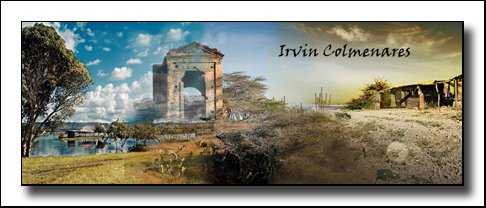




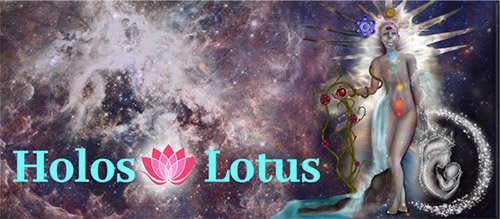

Comunidad Be Entrepreneur

Casualmente, éste film lo han reseñado mucho acá. El tema de por qué no come me ha llamado la atención, pero no lo suficiente para verla. Creo que hay algo oscuro o de terror. Y siempre evito eso jajajajaja.
No, no hay nada terrorífico, es un asunto de creencias. Muchas gracias por pasar y comentar estimado @neruel. Un fuerte abrazo desde Maracay.